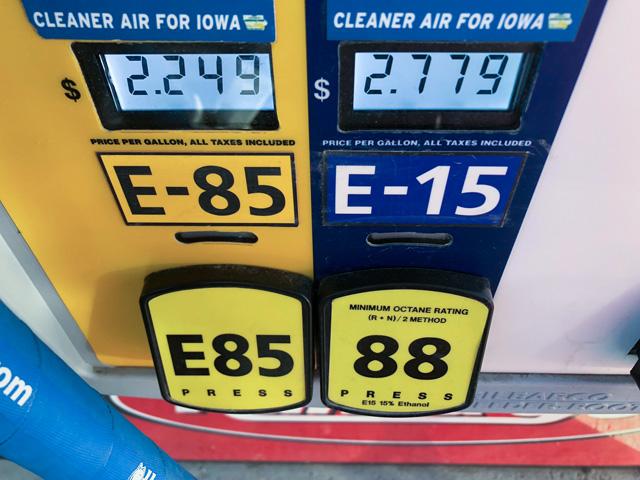Ag, Biofuels Groups Want E15 Rehearing
Groups Tell DC Circuit Court E15 Ruling Will Have 'Devastating' Consequences
LINCOLN, Neb. (DTN) -- Agriculture and biofuels groups asked for a rehearing on a July 2 court ruling that, if allowed to stand, will end year-round sales of E15, in a petition filed with the U.S. Court of Appeals for the District of Columbia Circuit.
The National Corn Growers Association, Growth Energy and the Renewable Fuels Association on Monday petitioned the D.C. Circuit for a rehearing before all judges in the circuit, arguing in the petition the future of the ethanol and agriculture industries depends on the ability to expand availability of ethanol blends above E10.
Monday was the deadline to petition the court for an en banc hearing before all 11 judges on the circuit.
"If allowed to stand, this court's decision to vacate EPA's rulemaking to allow E15 to be sold year-round will have devastating consequences for the market expansion of homegrown biofuels," the groups said in a statement.
"Petitioning for a rehearing is a critical next step in giving biofuel producers and farmers a fair shot in the marketplace and providing American drivers with better access to cleaner fuel choices. We are hopeful that the full court takes up the petition and reverses the panel's decision."
A three-judge panel on the D.C. Circuit said in its July 2, 19-page opinion on a case brought by refining interests that the so-called Reid-vapor pressure waiver rule that opened the door to E10 sales originally does not apply to E15, even though the Trump administration declared the two blends to be substantially similar fuels.
The Reid vapor pressure waiver, or RVP, is a measure of the volatility of gasoline.
The groups said the D.C. Circuit's ruling "conflicts" with Supreme Court and previous rulings in the circuit and "defeats" the intent of Congress to expand ethanol use.
P[L1] D[0x0] M[300x250] OOP[F] ADUNIT[] T[]
"The acknowledged purpose of the 1.0-psi waiver is to promote increased ethanol use if the fuel's volatility does not exceed a specified RVP limit, yet the panel construed the waiver to be available to E10 but not E15, which has more ethanol and lower RVP than E10," the petition said.
"This case also is exceptionally important. Because of its higher ethanol content and lower RVP, E15 better achieves Congress's environmental, economic and security goals than E10. The panel decision, however, effectively bars E15 from being used in the summer, relegating the country to using only E10 and depriving it of E15's many added benefits. The full court should grant rehearing to correct the panel's errors."
According to the Yale Journal on Regulation, the D.C. Circuit Court granted just eight en banc hearings from 2010 to 2017. All of the appeals courts combined grant between 80 and 90 en banc hearings each year.
Original restrictions on the sale of E15 were based on concerns about ozone pollution.
The E15 ruling was one of two legal setbacks for the biofuels industry this summer. The Supreme Court sided with refiners in a small-refinery exemptions case.
In October 2018, then-President Donald Trump directed EPA to allow year-round sales of E15.
Back in May 2020, the American Fuel and Petrochemical Manufacturers challenged EPA's action. The group argued that E15 is not a fuel substantially similar to E10, that the Reid vapor pressure waiver does not apply to blends higher than E10, and that the agency did not have the authority to "reopen" E15 waivers it granted for use in vehicles 2001 and newer.
Separately, Sen. Chuck Grassley, R-Iowa, told DTN on Tuesday it could be possible for legislation on E15 to be brought up, and at least some Midwest senators have introduced bills. Getting a bill through Congress by itself "would be practically an impossibility," Grassley said. "You've heard me express the difficulty of getting anything through when you are up against Big Oil," he said.
Senators could attempt to use the reconciliation process to bring an E15 bill to the floor as well. It might be possible to get some Democratic senators from the Midwest to support the bill, he said, citing Sens. Amy Klobuchar and Tina Smith of Minnesota, as well as Sen. Dick Durbin of Illinois.
"If we could get Democrats to offer that amendment, every Republican in the Midwest would support it. I think it would get overwhelmingly approved," Grassley said.
Read more on DTN:
"President Opens up E15 Sales," https://www.dtnpf.com/…
"Appeals Court Throws Out E15 Rule,"
Todd Neeley can be reached at todd.neeley@dtn.com
Follow him on Twitter @DTNeeley
DTN Ag Policy Editor Chris Clayton contributed to this report.
(c) Copyright 2021 DTN, LLC. All rights reserved.




